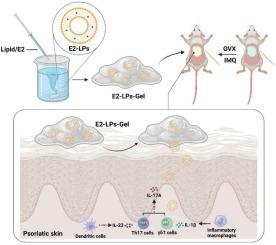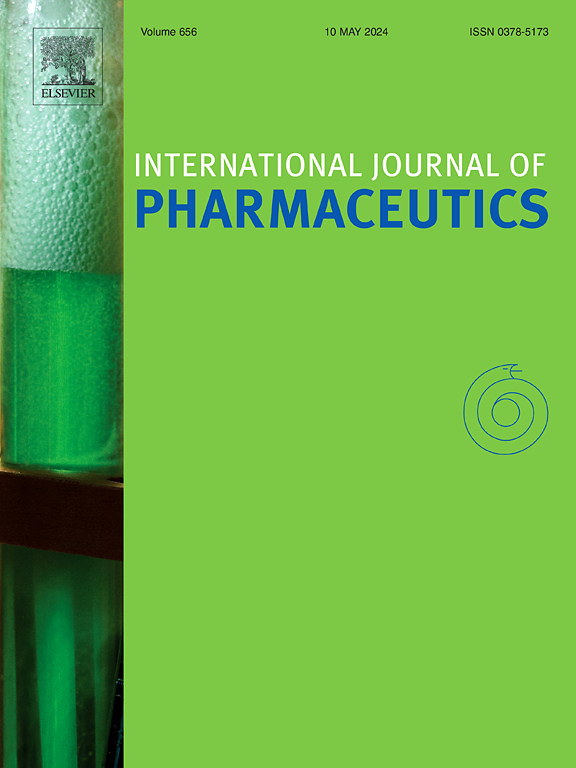基于雌二醇脂质体的经皮给药系统增强了银屑病皮肤炎症的缓解。
IF 5.2
2区 医学
Q1 PHARMACOLOGY & PHARMACY
引用次数: 0
摘要
银屑病是一种高发的慢性炎症性皮肤病,银屑病的发生和发展与免疫激活和角化细胞的异常增殖密切相关。雌二醇(Estradiol, E2)在银屑病发病中起重要作用,具有良好的抗炎作用,可抑制银屑病的炎症特征。然而,目前E2制剂的透皮效率普遍较低,替代给药途径可能与不良反应有关。在这里,我们提出了一种脂质体凝胶的透皮给药系统,旨在促进E2的透皮给药,以改善银屑病皮肤炎症。脂质体内的磷脂与角质层的脂质相互作用,渗透致密的皮肤结构,从而增加药物的皮内滞留。凝胶基质提供结构支撑,降低系统流动性,增强脂质体稳定性,有效防止药物从皮肤表面快速清除。为了评价E2脂质体凝胶治疗银屑病的疗效,我们进行了大量的体外和体内研究。结果表明,E2脂质体凝胶可以有效地穿透皮肤屏障,将E2输送到炎症部位。这导致白细胞介素-1β (IL-1β)、白细胞介素-23 (IL-23)和白细胞介素- 17a (IL-17A)的产生显著抑制,有效抑制角质形成细胞的异常增殖,从而改善银屑病皮肤炎症。综上所述,本研究为E2的持续控释提供了一种更安全有效的策略。这不仅为银屑病的治疗提供了更有希望的方法,也为探索E2在其他炎症性疾病中的作用提供了新的见解。本文章由计算机程序翻译,如有差异,请以英文原文为准。

A transdermal drug delivery system based on estradiol liposomes enhances the alleviation of psoriatic skin inflammation
Psoriasis is a highly prevalent and chronic inflammatory skin disease, the initiation and progression of psoriasis is closely associated with immune activation and abnormal proliferation of keratinocytes. Estradiol (E2) plays a significant role in psoriasis pathogenesis, exhibits favorable anti-inflammatory effects and could suppress the inflammation characteristic of psoriasis. However, the transdermal efficiency of current E2 formulations is generally low, and alternative administration routes may be associated with adverse effects. Here, we present a transdermal delivery system of liposome gel designed to facilitate the transdermal delivery of E2 to ameliorate psoriatic skin inflammation. The phospholipids within the liposomes interact with the lipids of the stratum corneum, permeating dense skin structure and thereby increasing the intradermal retention of the drug. The gel matrix provides structural support, which reduces fluidity of the system, enhances liposome stability, and effectively prevents the rapid clearance of the drug from skin surface. Extensive in vitro and in vivo studies were conducted to evaluate the therapeutic efficacy of E2 liposome gel in treating psoriasis. The results showed that E2 liposome gel could effectively penetrate the skin barrier and deliver E2 to the site of inflammation. This led to a significant inhibition of the production of interleukin-1β (IL-1β), interleukin-23 (IL-23), and interleukin-17A (IL-17A), effectively suppressed the abnormal proliferation of keratinocytes, thereby ameliorating psoriatic skin inflammation. In conclusion, this study provides a safer and more efficient strategy for the sustained and controlled release of E2. This not only offers a more promising therapeutic approach for psoriasis, but also provides new insights for exploring the role of E2 in other inflammatory diseases.
求助全文
通过发布文献求助,成功后即可免费获取论文全文。
去求助
来源期刊
CiteScore
10.70
自引率
8.60%
发文量
951
审稿时长
72 days
期刊介绍:
The International Journal of Pharmaceutics is the third most cited journal in the "Pharmacy & Pharmacology" category out of 366 journals, being the true home for pharmaceutical scientists concerned with the physical, chemical and biological properties of devices and delivery systems for drugs, vaccines and biologicals, including their design, manufacture and evaluation. This includes evaluation of the properties of drugs, excipients such as surfactants and polymers and novel materials. The journal has special sections on pharmaceutical nanotechnology and personalized medicines, and publishes research papers, reviews, commentaries and letters to the editor as well as special issues.

 求助内容:
求助内容: 应助结果提醒方式:
应助结果提醒方式:


